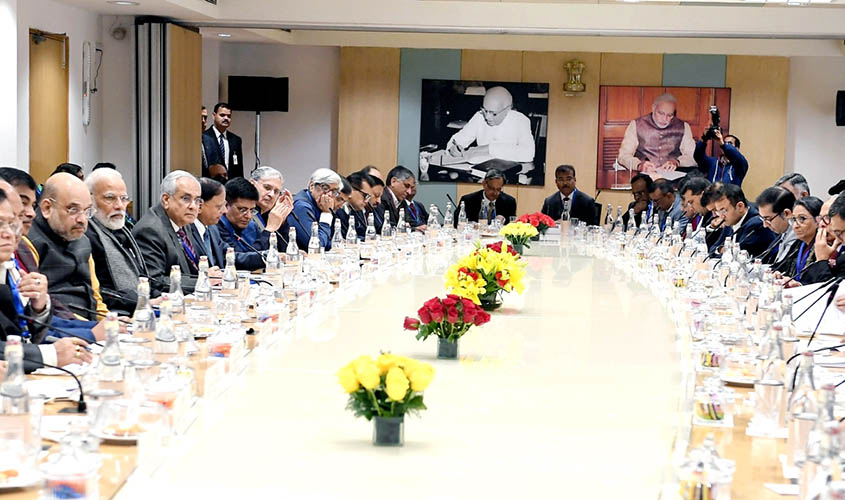PM Modi—who has the power and the stature to weed these folks out of the system, and indeed to end the deep pink state—must not allow himself to be smitten by the meretricious charms of socialism.
That Prime Minister Narendra Modi has been meeting all stakeholders to revive the economy is assuring. It shows his keenness to bring the economy back on track. But the five-trillion dollar question is: will the deep pink state allow him to implement the good ideas he may want to? One needs to be an incorrigible to answer in the affirmative.
A press release on the Prime Minister’s website said that on Thursday he interacted with various senior economists, private equity and venture capitalists, business leaders from manufacturing, travel & tourism, apparel & FMCG, analytics, subject experts in the fields of agriculture, science & technology, and finance. Prominent among the 38 delegates whom he met at Niti Aayog were economists Shankar Acharya, R. Nagaraj, and Farzana Afridi, venture capitalist Pradip Shah, industrialists Apparao Mallavarapu, Deep Kalra, Patanjali Govind Keswani, Deepak Seth, and Srikumar Misra, and domain experts Ashish Dhawan and Shiv Sarin.
This, according to the website www.moneycontrol.com, was not the only meeting that the Prime Minister has held recently. Quoting “top sources in the government” it said that over the last few days he has been brainstorming over a range of issues affecting the economy and thrash out appropriate policy interventions. “He has held as many as 12 meetings so far with groups of industrialists and experts. Each group has had between 10-12 people each and each meeting has been for three hours and more, in what probably is the most extensive ever consultations that Modi has held on matters related to the Union Budget and the economy in the past five years.”
The Prime Minister’s concern for the economy is indubitable. But one wonders what did these worthies tell Modi that a myriad other reports, Economic Surveys, etc., didn’t tell him earlier. The sum and substance of the reports and counsel was always the speeding up of economic reforms.
Further, it is not that Modi is an inveterate Leftist; it is well-known that he is opposed to Leftists and their fellow travellers. As Chief Minister of Gujarat, he was known to be business-friendly; in fact, this was the reason that India Inc was so bullish on his ascension to power in the run-up to the 2014 elections.
Before the 2014 elections, Modi had famously said that the business of government is not business. The votaries of liberalization saw an Indian Reagan in him. But that was not to be, for institutional mindset was always statist. The deep pink state has never been inactive; when it is not scuttling measures to open up the economy, it is bringing in price controls, introducing more stringent regulations, and generally making the lives of businesspersons miserable.
This is not surprising because the bureaucrats who man different ministries and departments, the experts engaged by government, taxmen, politicians, and other people who comprise the deep pink state have read the books written by Leftist academics. For these folks, the canards about capitalism are self-evident truths. So, it is axiomatic for them to believe that profit-oriented capitalists exploit the poor, that the system is based on exploitation, that socialism is an inherently virtuous system, that businesspersons are an unscrupulous, odious lot who are best kept on a tight leash.
Their beliefs get translated into action. Which explains the myriad rules and regulations government keeps coming up with, most of which torment industry. In such a climate of opinion, everybody falls in love with socialism: it allows the idealist to play god and the crook to fleece wealth creators; one dons the mantle of Robin Hood, the other of Gabbar Singh. Both end up becoming the bane of mankind.
Ragnar Danneskjöld, a key figure in Ayn Rand’s Atlas Shrugged, said, “I’m after a man whom I want to destroy. He died many centuries ago, but until the last trace of him is wiped out of men’s minds, we will not have a decent world to live in.” That man is Robin Hood. The reason: “He is held to be the first man who assumed a halo of virtue by practicing charity with wealth which he did not own, by giving away goods which he had not produced… He is the man who became the symbol of the idea that need, not achievement, is the source of rights, that we don’t have to produce, only to want, that the earned does not belong to us, but the unearned does.”
A Robin Hood is more dangerous than a Gabbar Singh, for the latter doesn’t justify his loot; he just says that I am stronger than you, so you should pay me to keep yourself safe. He is a brute, just asserting that might is right, not justifying his loot. He can be placated, as there is a possibility of sating his greed. Robin Hood, on the other hand, is relentless. He is a sophist; he uses rhetoric to prove that felony is in the best interests of mankind. The tragedy of India today is that there are too many Robin Hoods and Gabbar Singhs in the system.
PM Modi—who has the power and the stature to weed these folks out of the system, and indeed to end the deep pink state—must not allow himself to be smitten by the meretricious charms of socialism. He and his government must revive the economy by initiating big-ticket reforms. This will be far more effective than endless rounds of meetings. Without liberalization, all these gatherings will prove to be Sisyphean.
Ravi Shanker Kapoor is a freelance journalist

